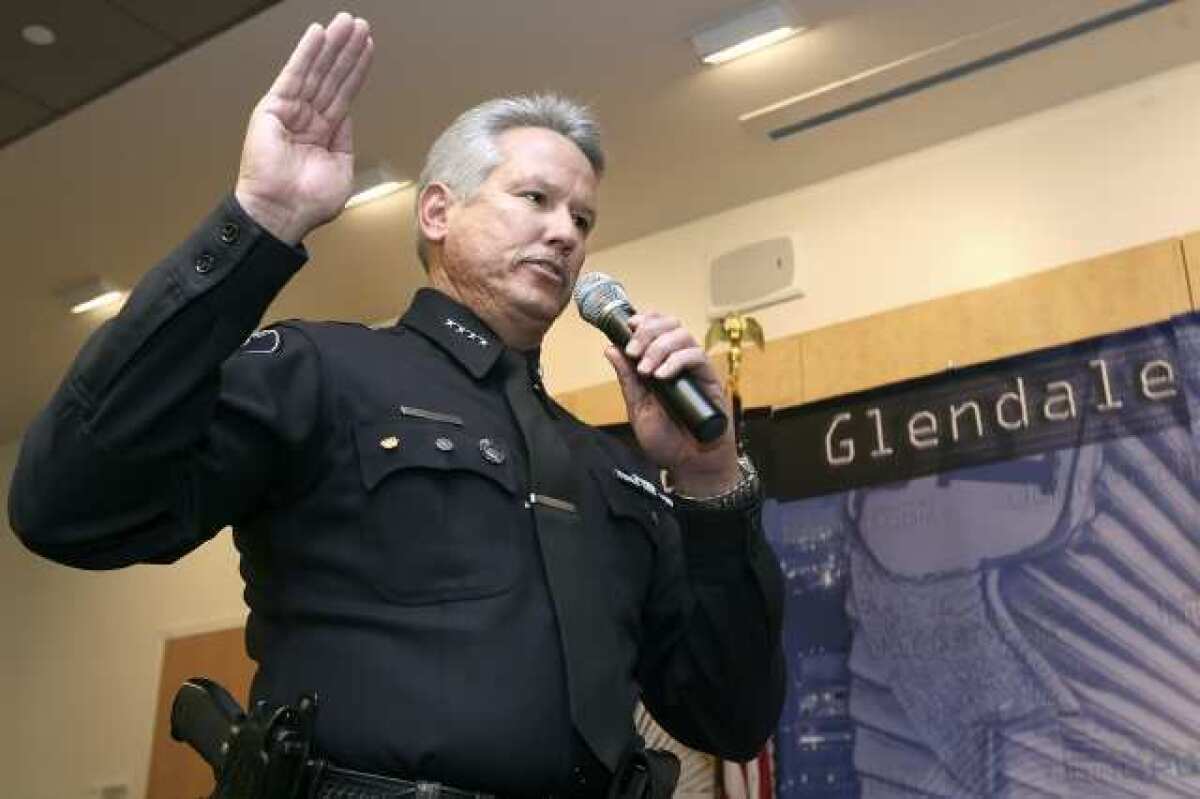DePompa stays, gets hourly pay

Glendale Police Chief Ron De Pompa quietly announced his retirement in late February, but was quickly hired back as an hourly employee until the city can replace him. He is expected to earn $103 per hour on top of his roughly $192,600 state pension.
De Pompa, 57, has worked at the department for about 37 years and so gets 90% of his salary under the California Public Employees’ Retirement System, or CalPERS.
According to City Manager Scott Ochoa, De Pompa’s base salary was approximately $214,000.
The chief’s retirement, effective March 2, was announced in a Feb. 26 memo from Ochoa, who said he asked De Pompa to continue working as an hourly employee until the city finds a replacement.
De Pompa’s hourly status will enable “continuity of leadership as we finish out the fiscal year and prepare the Police Department budget for the coming year,” Ochoa wrote.
De Pompa declined to comment, referring all inquiries to Ochoa.
“I asked him to stay and he is staying,” Ochoa said.
City officials note that because De Pompa is an hourly employee, Glendale will be saving money by not having to contribute to his pension and medical benefits.
“As a matter of business, this makes sense,” Ochoa said.
Councilman Ara Najarian also agreed the move would save the city money when compared to hiring new full-time chief.
“I think the Police Department is such a critical city department that I’d make an exception to my usual opposition to accepting retirement [benefits] and hourly wages,” he said.
The move to keep De Pompa on as interim chief would allow him to complete a number of organizational changes at the department, Ochoa said.
De Pompa reportedly approached Ochoa early last year about his desire to retire, having overseen some major changes at the Police Department, including the implementation of command areas throughout the city.
But Ochoa, who had just been hired as city manager, said he was trying to manage other major departmental changes at City Hall, including the resignation of Glendale Water & Power General Manager Glenn Steiger and the appointment Public Works Director Steve Zurn to fill the void.
Ochoa wanted to avoid another “shock to the system” as the city went through an “unprecedented amount of change,” he said, so De Pompa agreed to postpone his retirement.
The chief has since continued in his duties, even though he has already reached the maximum amount he can receive for his pension while salaries have stayed flat.
Still, the practice of officials drawing a pension while continuing to work for the government — a practice known as “double-dipping” — has its critics at all levels.
“I would call this double-dipping if the retiree is less than what most consider standard retirement age, i.e., about 65,” Joe Nation, a public policy professor at Stanford University and former Marin County assemblyman, said in an email.
While acknowledging that the practice is legal, he added that “the public employee retirement system in California is fundamentally corrupt.”
Brittany Levine contributed to this report.
--
Follow Veronica Rocha on Google+ and on Twitter: @VeronicaRochaLA.